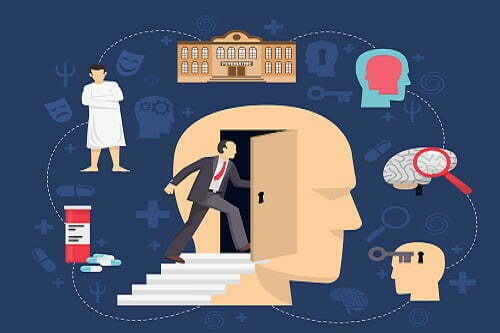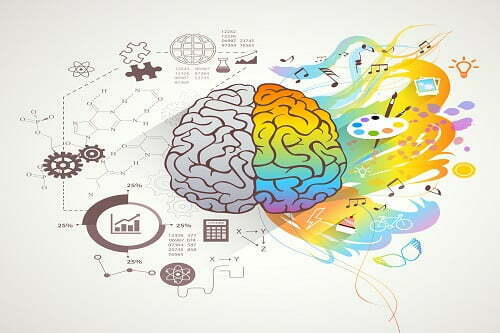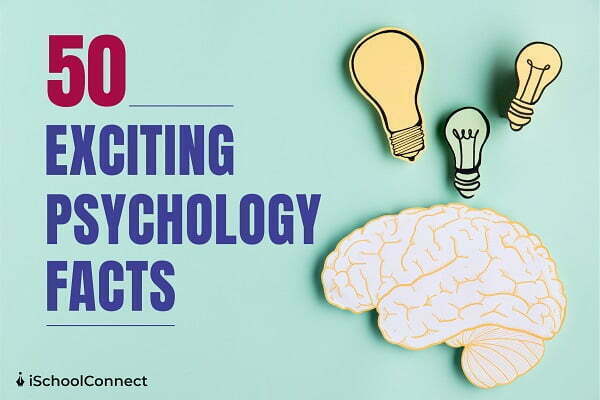Psychology facts
Before we read some interesting psychology facts, let’s learn more about psychology itself.
Psychology as an independent field of study originated from Greece around 400 to 500 BC. From questioning what makes us think and also function the way we do, to dictating the rules under which humans behave; psychology has emerged as a lucrative field of study. It works to achieve four major goals with objectives of the field. These are-
- Describing human thoughts and behavior
- Explaining human thoughts and behavior
- Predicting human thoughts and behavior
- Changing human thoughts and behavior
So while achieving these 4 critical goals, research and studies have revealed several interesting psychology facts. Right from explaining behavior to detangling mixed emotions, here are 50 psychology facts that will have you hooked and eager to learn more!

1. If you cry tears of happiness, chances are the first tear came from your right eye. Tears of sorrow, however, begin with the first tear coming from the left eye.
2. The food you make may not taste as good as the food someone else makes, despite having the same recipe!
3. “Will I?” is a question that can motivate you a lot more than the statement “I will.”
4. Human nature resorts to anticipating negative outcomes when not knowing what to expect in a situation.
5. Dreams and their meanings are as significant as conscious thoughts.
6. The connection between the mind and the body is not an unrecognized one! So every thought in your mind can have an equivalent reaction to the cells in your body.
7. You are often told to dress appropriately in different situations. This is because there is an established connection between the way an individual dresses and their mood in an environment. This is among the most relatable psychology facts, since how we dress expresses our identity.
8. If you are looking to add a new habit into your everyday routine, do it for 66 days. This is the average time required to make a daily habit.
9. When an individual looks at an object of interest and fascination, they have recorded their pupils to dilate by as much as 45%.
10. Human nature involves breaking complex information into 3 or 4 chunks. You can try this out by noting how you memorize a long phone number.

11. The current human brain size has decreased by 10% compared to the size of Neanderthals.
12. The type of music you listen to affects the way you perceive the world.
13. If you have answered a tricky question with sarcasm, research suggests that you have a healthy and functioning brain!
14. How often have you yawned when you see someone near you yawn? This is a phenomenon and among the few common psychology facts that have been explained by human nature to express empathy.
15. A single negative sentence or event can outweigh a minimum of 5 positive things.
16. An individual will experience 7 minutes of intense neural activity before passing away.
17. People can die from a broken heart. This phenomenon is also called stress cardiomyopathy. The short-term effect of the broken-heart syndrome is heart muscle dysfunction.
18. A common occurrence among human beings is cognitive dissonance. This happens when people have two contradicting values and modify one to align with the other.
19. You are more likely to read a long line quickly as opposed to a shorter line. However, there is still a general preference for shorter lines.
20. Have you ever wondered how many close friendships or relationships you can have? Research reveals that it is difficult to maintain relationships that exceed 150 in numbers.
21. The starting and ending of an event are significantly easier to recall as compared to the middle.
22. Repetition of information and also events have an actual impact on the brain as it facilitates new associations between the brain cells.

23. Women have half the pain receptors that males do on their bodies. They also have a significantly higher threshold for pain.
24. Writing your thoughts down is a great way to calm your brain and also enjoy a good night’s rest.
25. Authority as a force has as much effect on the human brain as trauma or brain injury.
26. Traveling can significantly lower an individual’s potential to fall prey to depression and heart disease.
27. Loneliness has a significantly negative impact on your health.
28. Do you remember the pain from your first broken relationship? What about the pain from when you injured your knee? Emotional pain is a lot easier to recall than physical pain and can also contribute significantly to behavior.
29. Is watching crime shows on Netflix your favorite thing to do? Psychology says you are more likely to overestimate the amount of crime happening in the world with continued exposure to crime on the net.
30. If you want to make your decisions carefully, think about them in another language. Thinking in a different language can help you make rational decisions.
31. The attention span of humans is around 20 minutes.
32. Our attention span is even shorter than what it was a decade ago.
33. Under the effect of alcohol and other substances, the brain does not form memories just as easily.
34. Did you know you can power a light bulb with your brain? The brain is an organ that can generate between 12 to 25 Watts of electricity.

35. The Canonical Perspective – Individuals are more likely to draw and visualize objects from a slighter higher viewpoint.
36. Fear can be a fun emotion to experience, especially when you are not in danger. This is primarily because of hormones. For example, when you are watching a horror movie, the experience of fear can prove enjoyable because the brain also recognizes that you are not in actual danger.
37. We are more likely to care about a single person as opposed to a massive event.
38. If you are in a situation where your freedom is compromised by certain hard and fast rules, chances are you will break the rule. This is more in an attempt to regain your lost freedom.
39. Do you enjoy sharing your thoughts, hobbies, and interests with others? You are not alone! So, studies in psychology have revealed that the reward centers of our brain light up when we are engaged in a discussion about ourselves. This is as compared to when we are talking about other people.
40. When looking at something cute, like a baby or an animal, we are often overwhelmed by a torrent of positive emotions. The aggression comes up to balance the “high” from the emotions we experience. The aggressive tendency, however, is minimal and often not acted upon.
41. Rejection is often experienced as physical discomfort.
42. Six primary feelings are conveyed universally. These are surprise, disgust, anxiety, sorrow, rage, and happiness. This is among the psychology facts that explain why emotions are felt so similarly by different individuals.
43. The busier you are, the happier you are likely to be!

44. A close embrace with another person for more than twenty seconds will produce feel-good hormones in the body.
45. Water has a profound impact on the human psyche. The sight of water bodies and also the sound of water produces relaxing and calming effects on people.
46. Chocolate has a positive impact on our mood because it releases the chemical oxytocin when consumed.
47. If we have a Plan B, Plan A is less likely to work.
48. Short-term and long-term memories are saved at around the same time!
49. Information that is easier to access is harder to remember.
50. Finally, did you know that the brain has close to 70,000 thoughts on average every day? However, an estimated 60 to 70 percent of those thoughts are considered negative.
In a Nutshell
Psychology is a dynamic and engaging field, with numerous studies shedding light on how humans behave and why they do things in a certain manner. Hence, with newer and relevant research being conducted, we are one step closer to understanding more about the human mind. This is a discipline that promises a scientific and thorough understanding not only of the human mind but also of human behavior!
We hope you liked this blog and found it informative. To clear any of your doubts, you can contact us. Also, feel free to comment below and drop your thoughts as well!
Did you like this blog? If you did, we’re sure you will also like this one- What is psychology? Top 10 best psychology courses for you!
FAQs
Q1. Why do pain signals travel slower in the brain?
Answer – Pain signals are often carried out by nerves that have a thin layer of myelin. Hence, they are significantly slower as opposed to nerves that have a thicker layer of myelin.
Q2. Why are some research papers published with content in two columns of shorter sentences?
Answer – This is because humans are more likely to grasp information from shorter sentences, as opposed to longer sentences.
Q3. What are the symptoms of broken heart syndrome?
Answer – Some of the most common symptoms of broken heart syndrome are irregular heartbeats, shortness of breath, and also severe and sudden chest pain.






